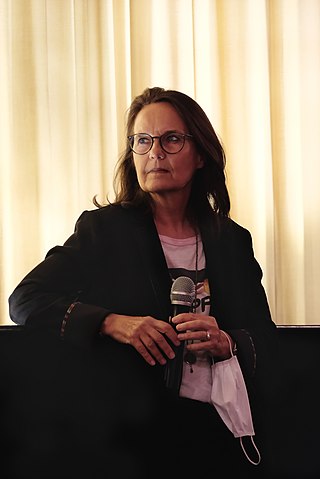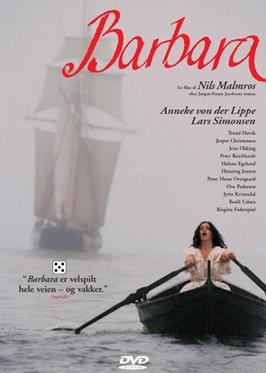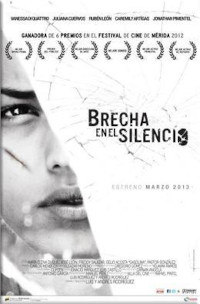
Good Bye, Lenin! is a 2003 German tragicomedy film, directed by Wolfgang Becker. The cast includes Daniel Brühl, Katrin Sass, Chulpan Khamatova, and Maria Simon. The story follows a family in East Germany (GDR); the mother (Sass) is dedicated to the socialist cause and falls into a coma in October 1989, shortly before the Peaceful Revolution in November. When she awakens eight months later in June 1990, her son (Brühl) attempts to protect her from a fatal shock by concealing the fall of the Berlin Wall and the collapse of Communism in East Germany.

Through a Glass Darkly is a 1961 Swedish drama film written and directed by Ingmar Bergman, and starring Harriet Andersson, Gunnar Björnstrand, Max von Sydow and Lars Passgård. The film tells the story of a schizophrenic young woman (Andersson) vacationing on a remote island with her husband, novelist father (Björnstrand), and frustrated younger brother (Passgård).

The Nasty Girl is a 1990 West German drama film based on the true story of Anna Rosmus.

Caroline Link is a German TV and film director and screenwriter.

Sylvie Testud is a French actress whose film career began in 1991. She won the César Award for Most Promising Actress for Murderous Maids (2000), the César Award for Best Actress for Fear and Trembling (2003), and the European Film Award for Best Actress for Lourdes (2009). Her other film roles include Beyond Silence (1996), La Vie en Rose (2007), and French Women (2014).
'38 – Vienna Before the Fall is a 1987 Austrian-West German co-produced drama film directed by Wolfgang Glück. It was nominated for the Academy Award for Best Foreign Language Film at the 59th Academy Awards. It is set in Vienna in 1937–1938 at the time of the Anschluss.

Breaking the Silence is a 2000 Chinese film directed by Sun Zhou. It was China's submission to the 73rd Academy Awards for the Academy Award for Best Foreign Language Film, but was not accepted as a nominee.

Moloch is a 1999 Russian biographical film, directed by Alexander Sokurov. The storyline was conceived from a screenplay written by Yuri Arabov and Marina Koreneva. It portrays Adolf Hitler living life in an unassuming manner during an abrupt journey to the Bavarian Alps. The film stars actors Leonid Mozgovoy, Yelena Rufanova, Vladimir Bogdanov, and Leonid Sokol in principal roles. Moloch explores companionship, intimacy and dictatorship.

Her Third is a 1972 East German film directed by Egon Günther and starring Jutta Hoffmann, Barbara Dittus, Rolf Ludwig and Armin Mueller-Stahl. The film is based on the short story Unter den Bäumen regnet es zweimal by Eberhard Panitz and tells the story of the single mother Margit looking for a new partner. The film was produced in 1971 by the DEFA film studio and premiered on 16 March, 1972 in East Berlin.

Barbara is a 1997 Danish drama film directed by Nils Malmros and stars Anneke von der Lippe and Lars Simonsen. Adapted from the classic Faroese novel by writer Jørgen-Frantz Jacobsen, the film is about a minister in the 18th century who is captivated by the overt sexuality of a promiscuous woman and marries her. Set in the Faroe Islands, the film was Malmros' first diversion from his usual subject of adolescents in Århus, and his own experiences.

People Meet and Sweet Music Fills the Heart,, is a 1967 Danish/Swedish romantic comedy directed by Henning Carlsen and starring Harriet Andersson and Preben Neergaard. The film is based upon the 1944 novel by Jens August Schade.

Honey is a 2010 Turkish drama film directed by Semih Kaplanoğlu, the third and final installment of the "Yusuf Trilogy", which includes Egg and Milk. It premiered on 16 February 2010 in competition at the 60th Berlin International Film Festival, where it became the third Turkish film, after Susuz Yaz in 1964 and Head-On in 2004, to win the Golden Bear award. The film, which went on general release across Turkey on 9 April 2010, was selected as Turkey's official candidate for the Best Foreign Film Oscar at the 83rd Academy Awards but it did not make the final shortlist.

Iris ter Schiphorst is a German composer and musician.
Mark Andre is a French composer living in Germany. He was known as "Marc André", his birth name, until 2007, when he formally revised the spelling. He lives in Berlin. Andre's compositions durch (2006), ...auf... III (2007), and Wunderzaichen (2014) received multiple votes in a 2017 Classic Voice poll of the greatest works of art music since 2000.

Breach in the Silence is a 2012 Venezuelan drama film directed by Luis Rodríguez and Andrés Rodríguez. The film was selected as the Venezuelan entry for the Best Foreign Language Film at the 86th Academy Awards, but it was not nominated.

Cosmos is a Canadian drama film, released in 1996. Written and directed by Jennifer Alleyn, Manon Briand, Marie-Julie Dallaire, Arto Paragamian, André Turpin and Denis Villeneuve, the film is an anthology of six short films, one by each of the credited directors, linked by the common character of Cosmos, a Greek immigrant working as a cab driver in Montreal.
Alpine Fire is a 1985 Swiss drama film directed by Fredi M. Murer. It won the Golden Leopard at the 1985 Locarno International Film Festival. The film was selected as the Swiss entry for the Best Foreign Language Film at the 58th Academy Awards, but was not accepted as a nominee.
The Unfish is a 1997 Austrian comedy film directed by Robert Dornhelm. The film was selected as the Austrian entry for the Best Foreign Language Film at the 70th Academy Awards, but was not accepted as a nominee.













